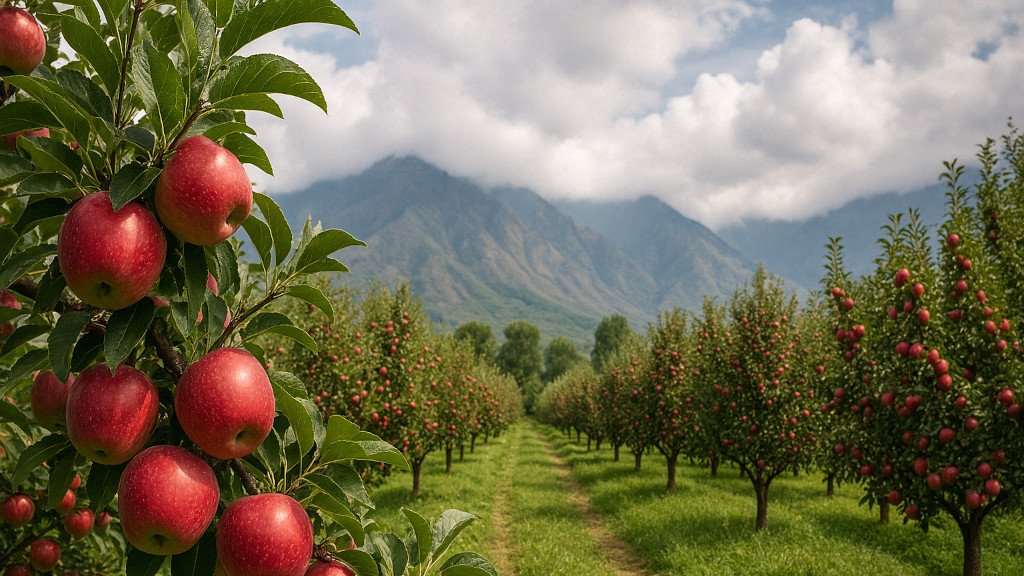In the heart of Srinagar, apple growers, scientists, and agricultural experts gathered for a discussion that may not have made big headlines but holds significant meaning for those working the orchards of Kashmir. Hosted by Dhanuka Agritech, one of India’s prominent agrochemical companies, the program focused on the scientific management of apples—a crop deeply tied to the identity and economy of the region.
This wasn’t a typical corporate event with grand announcements. Instead, it was more of a knowledge-sharing platform, where farmers listened, questioned, and contributed alongside researchers and company leaders. The aim was straightforward: help apple growers deal with real problems they face in their orchards—from pest infestations to falling yields—using practical tools backed by science.
A Regional Focus with National Implications
The setting of Srinagar was fitting. Kashmir’s apple industry has long been recognized for its contribution to the country’s horticultural output. Yet, in recent years, growers have grappled with shifting weather patterns, pest pressures, and market challenges. Dhanuka Agritech chose this location deliberately, signaling that attention must be paid where it’s most needed.
Dr MK Verma, Director of Agriculture at the ICAR-Central Institute of Temperate Horticulture (ICAR-CITH), served as the chief guest. In his remarks, he noted the changing landscape of apple cultivation in Kashmir. High-density planting, he explained, is moving apple orchards from wide-spaced, traditional layouts to tightly packed rows—reducing spacing from up to 16 feet to just 3–4 feet. The impact of this shift is significant: potential yields could rise from 11 tons per hectare to over 60 tons.
But he also cautioned that greater productivity depends on how well farmers adapt to challenges, including those brought on by changing weather and shifting pest patterns.
Addressing the Daily Challenges of Orchard Management
One of the central themes of the event was disease and pest management—real issues that farmers deal with each season. Apple scab, spider mite infestations, and premature leaf fall are just a few of the recurring problems in orchards across Jammu and Kashmir. Dhanuka Agritech’s latest offerings aimed to address these specifically.
The company introduced a range of crop protection products under its newly launched portfolio tailored for apple growers. Among these was a product called “MIYAKO,” developed in collaboration with Nissan Chemicals of Japan. This miticide is intended to help control spider mite outbreaks—a growing concern for apple farmers, especially with the warming climate.
Two other products—“DELIGHT” (containing Dodine 65% WP) and “CURSOR” (a Flusilazole-based fungicide)—were also showcased for their roles in disease management and fruit quality improvement. These additions are part of Dhanuka Agritech’s broader strategy to offer solutions that are not only effective but safer and more sustainable for long-term use.
Listening to Scientists and Farmers
The event wasn’t just a platform for product launches. Experts from universities and research institutions provided crucial context. Dr. Manzoor A. Parray, Head of Entomology at SKUAST-K (Sher-e-Kashmir University of Agricultural Sciences and Technology of Kashmir), pointed out how climate shifts are changing the behavior of pests. The once-predictable life cycles of common orchard pests are now harder to manage, and growers need more adaptable strategies to stay ahead.
His emphasis on spider mite infestations resonated with many farmers in the audience who have seen the damage firsthand. These pests, tiny as they are, can cause significant economic losses when not managed in time. And traditional methods don’t always work in today’s changing climatic conditions.
Also Read: SKUAST-K and IIT Bombay Collaborate to Advance Agricultural Research and Innovation
A Conversation Beyond Chemicals
While crop protection formed a core part of the discussions, there was also a broader conversation around how the apple industry in Kashmir could evolve in a balanced and sustainable way. Dr RG Agarwal, Chairman Emeritus of Dhanuka Agritech, underlined the need to look at agriculture as more than just production. He linked food security to nutritional security, highlighting how horticultural crops like apples contribute not just to economic growth but also to national well-being.
Dr. Agarwal’s remarks also emphasized the importance of youth in Indian agriculture. His point was simple: the future of farming lies in how the younger generation approaches it. If young farmers are given the right tools, access to modern knowledge, and support from both public and private sectors, the agriculture sector can find new direction—not through reinvention, but through better application of what we already know.
Dhanuka Agritech: Building Stronger Bridges Between Research and Practice
Another important takeaway from the event was the role of collaboration. Dhanuka Agritech has signed Memorandums of Understanding (MoUs) with ICAR and 15 agricultural universities across India. These partnerships aim to bridge the often-wide gap between agricultural research and the practical realities faced by farmers.
Through these efforts, Dhanuka Agritech hopes to support not just the development of products but also the education and training of farmers, making it easier for them to adopt new techniques and tools. These aren’t one-off gestures—they are part of a broader strategy to integrate scientific findings into everyday farming.
The event in Srinagar might not have had the spectacle of a large trade fair or the instant buzz of a viral announcement, but it left a meaningful impact on those who attended. By focusing on practical issues, offering tangible solutions, and engaging with the people who actually work the land, Dhanuka Agritech set a tone that more agricultural initiatives could learn from.
For Kashmir’s apple farmers, the road ahead is both promising and challenging. Higher yields are possible, but only if they are paired with better pest management, smarter planting practices, and continuous learning. As weather patterns shift and market dynamics evolve, the support from both public institutions and companies like Dhanuka Agritech could prove vital—not just for apples, but for the people who grow them.


